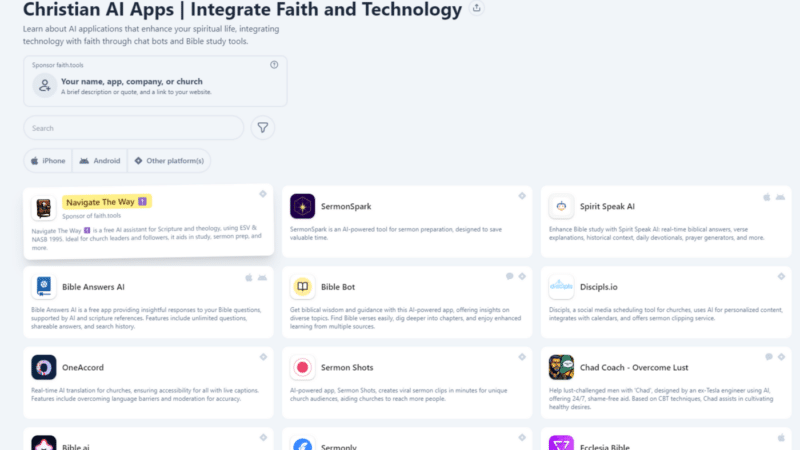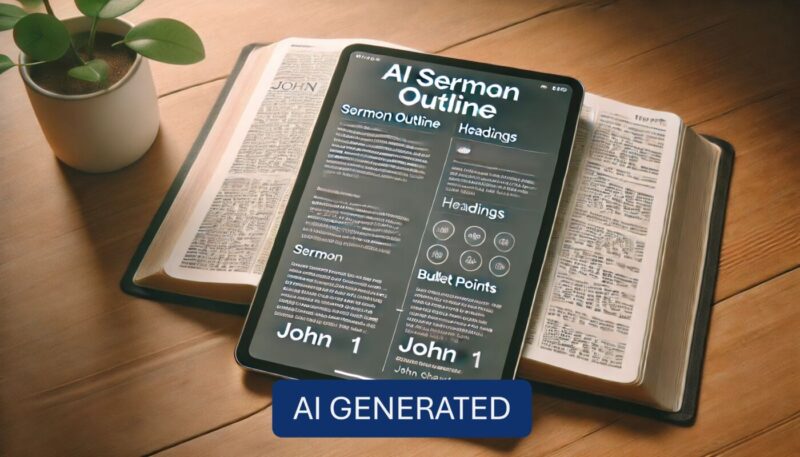AI and the future of Christian ministry — here’s what you need to know
Did you know that AI can now see and hear – as well as speak, read and write?
On YouTube, you can find examples of people using AI to help them locate objects, like pointing their phone camera around the room and saying, ‘help me find my glasses. Or they open the fridge and say, ‘Here’s what I have, what can I cook for dinner … in 15 minutes? … in an Italian style?’ etc.
Recently, Google made its AI NotebookLM available in the UK. I took our church’s Annual Report for 2023 and gave it to the NotebookLM. Within a few minutes, an engaging and entertaining podcast between two (AI) parties was generated. They discussed the events and happenings at our church with zest and banter. It was very listenable. Google is working on extending this so that a human listener can jump into the podcast themselves to ask questions to which the AI hosts respond instantaneously. What an imaginative way for any of us to take on or learn a new topic!
At the same time, there are deepfakes and scary stories. It’s never been easier for someone to create or spread viral misinformation. Fake images of Donald Trump “saving babies” in the aftermath of the Florida floods were widely circulated recently. One senior (Republican) politician who posted these said she knew the image was fake, but that didn’t matter to her because the image was “emblematic” of the truth — in other words, they felt it should be true, and that makes it “true”.
AI is like a sponge. It will soak up whatever values it can find from whatever data it can find
Such immensely powerful technology can be used for good or for ill. But, for Christian ministry, are there specific areas of AI to embrace or avoid? Are there pitfalls to watch out for?
Why don’t we just ban it?
Many Christians’ response is to avoid AI altogether. But this is impractical—like trying to ban the internet. The genie is out of the bottle. Instead, we need to develop “AI literacy” and use AI in a way that aligns with Christian values. Used in line with Gospel values, we, at the AI Christian Partnership (AICP), believe that AI could become a powerful tool for ministry.
Let’s look at a few of the tools out there, for Christian ministry, and draw some conclusions.
Sample AI tools for Christian Ministry
Sermon generation
A sermon should contain the heart of the preacher, and it should address a specific congregation in a local context. We don’t always manage to do this 100% but it’s the aim of any preacher.
AI can certainly produce impactful, theologically robust sermons and exceed the ability of some preachers in this regard, but AI’s lack of human experience, coupled with no knowledge of the congregation, ultimately means it lacks humanity and the prompting of the Holy Spirit. See this article by Tim Bull from AICP.
Use AI as a critic, not a creator
Sermon Support/small group support
There are also AI tools that can “repurpose” a sermon and, eg produce an excellent set of small-group questions. But it can do more than that.
Recently, I wrote a sermon based on Genesis 39, where Joseph the dreamer is in Potiphar’s house. My sermon addressed the injustice of Joseph’s situation and his imprisonment. As an analogy, I compared it to the recent injustices perpetrated against UK postmasters and their imprisonment.
So, I gave an AI tool the link to the YouTube video of our church service, and, in minutes, it created a chatbot based on that one sermon. I then engaged the bot in conversation, asking it to summarise the sermon, give me quotes and opinions on the sermon etc. It did this, even going outside of Genesis 39 when it needed to. It answered my questions to a high standard.
However, it did fall into error. At one point the bot introduced me to the famous ‘Paul of Ennells’ – apparently an accomplished Christian leader involved with the postmasters and who featured in my sermon (you mean you haven’t heard of him?). It took some time for the bot to realise there was no such person. My sermon had referred to ‘Paula Vennells’ the ex-CEO of the Post Office. Obvious to us, but for AI, despite its lightning speed and amazing creativity, blatant mistakes are not uncommon.[1]
Church communications
For creating mailings, newsletters, etc, AI tools are excellent at smoothing out sentences and making our language more engaging. I commonly use such tools.[2]
Church workflows
Let me tell you about our church kitchen. Our kitchen project was first mooted 3 years ago but, despite much discussion, has not yet actually started (typical church project!) Recently, I asked an AI to trawl through all my church email threads from the past three years and produce a summary of all the proposals and the objections. I have to say it did a reasonable job. Not perfect, but it helped me to remember discussions I had forgotten (or perhaps blanked out!)
AI can be excellent at summarising and collating many types of information, including books, papers and articles on the internet.
For AI, despite its lightning speed and amazing creativity, blatant mistakes are not uncommon
Youth Ministry
While AI might seem futuristic to many, it’s already a part of daily life for teens, many of whom already use AI apps and bots. There are AI “conversational bot-friends” that can be customised in appearance, conversation and mannerisms. They learn more about their users over time and can become highly addictive. I am told that some young people prefer to confide in a bot than in a human –and why not, when the bot is non-judgmental and 100% confidential? But there are obvious dangers, especially for young people who may feel disaffected or lonely. [3]
We need to educate our young people to understand AI’s benefits and dangers. Youthscape (a member of AICP) have produced supporting materials on AI for youth leaders.
Theology bots
Here lies a real danger. I have seen an increasing number of AI bots/websites out there with attractive names implying Bible knowledge, Christian theology, etc. While some of these are from respected sources—such as the Catholic church’s Magesterium AI—most are popping up out of nowhere.
I have engaged some of these theology bots, asking them questions and checking their answers with mixed results. But my concern is that, sometimes, you cannot trace the people behind them. When I asked some bots, ‘Who made you?’ they replied with nebulous statements like ‘A generous group of Christians who want to help.’
That could mean anything! It’s like someone saying ‘Here’s an amazing book of Christian theology. There’s no named author or publisher, but don’t worry about it!’[4]
Due to lack of space I don’t address the use of AI in other ministries — from video editing and PowerPoint production, to the more contentious writing of worship songs and pastoral care.
Valuing AI alongside human endeavour
Let me draw some conclusions and suggest a few practical tips.
Three conclusions about AI and ministry
First, remember AI is like a sponge. It will soak up whatever values it can find from whatever data it can find. This includes data that may be biased against Christianity, or just wrong.
Second, all of these tools have plusses and minuses. You could end up with a great asset for ministry or a “fast-food” version of ministry, lacking the Holy Spirit and genuine human experience.
Third, sometimes, there is value in human struggle. Sure, AI can save valuable time, but equally, it is often in the wrestling with the task of ministry that God is most evident. In the human striving to create a worship song, a sermon, or an article, God is often present, shaping what we do and, significantly, shaping us at the same time.
How then do we use AI well?
The church has always adapted to new technology – albeit often reluctantly – and we will do so again. AI will even bring new opportunities for sharing the gospel, it is already driving a resurgence in spirituality. But, like any powerful tool, we must not become a slave to it – how can we do that?
- Use AI as a critic, not a creator
Use AI to refine your work rather than do it for you. For example, try typing ‘Here’s an article/sermon I wrote. Please critique it and find the weaknesses in my arguments.’
Don’t type, ‘Write this sermon for me.’ - Use AI to extend what you do, not replace what you do
AI is helpful for information gathering, summarising websites, books etc (watch out for errors) and it’s great for brainstorming ideas.
But make your decisions based on human judgment. - Use AI like an intern, not a colleague
Like an intern AI is knowledgeable and “keen to help”, but doesn’t know you or you organisation, and it will make mistakes. It will enthusiastically make suggestions, offer ideas etc – and get stuff wrong. This is all fine so long as you remain the expert. If you use it “like magic”, it will undermine you.
Learn to ask great questions and scrutinise the answers well.
This article is based on an original article written for Preach Magazine and appears here with their permission
Enjoyed this? Check out this interview by GodTV
For information and occasional updates about AI and Christianity sign up to the AI Christian Partnership newsletter
[1] Tools used: pastors.ai, sermonshots.com, pulpitai.com
[2] Tools used: Hemingway, ChatGPT, Jasper, Grammarly
[3] Tools used: replika.ai
[4] Application names omitted




Really helpful article Chris, and I welcome the formation and development of the AI Christian Partnership. My hope is that dealing with the issues around AI facilitates us having discussions in churches about critiqueing sources and developing wisdom and discernment about what and where we get info from. Too many times I experience people saying ‘I’ve heard…’ or ‘I’ve read…’ with no discernment as to the validity of the source. I think the fears around AI might bring these issues into sharp relief and allow us to have helpful conversations in our churches. We so need people like yourself with… Read more »
Thx. In fact I feel AI could even help us to be ‘more human’. I was in a meeting discussing the role of AI (if any) in care and it made us think and articulate what is really different unique about person to person care. Simple example, however good AI becomes at initiating conversation and engaging in games and small talk etc it can’t do something as simple as have a cup of tea
Just fascinating
As we were discussing last time
Scary stuff .… been using ai a lot recently!
Hello Chris and thank you for the article. AI is all around us. You mention that you can use AI to find your glasses. I use something similar on my phone to see and identify something I cannot see and it is an app named “Be My Eyes” It is useful for merely finding out information quickly, I have used this. However, the concern is the monster that it can be and what it can create A recent storyline on Coronation St. was a storyline in which someone was scammed. In the scam, the character had lost a child and the… Read more »
Understand your concern Ian. There are wonderful advances that AI is bringing for example in medicine and education, but, at the same time, it is so easy now to generate ‘deep fakes’ with the most rudimentary knowledge and free to use tools. Yhe answer is we must become ‘AI literate’. Thx